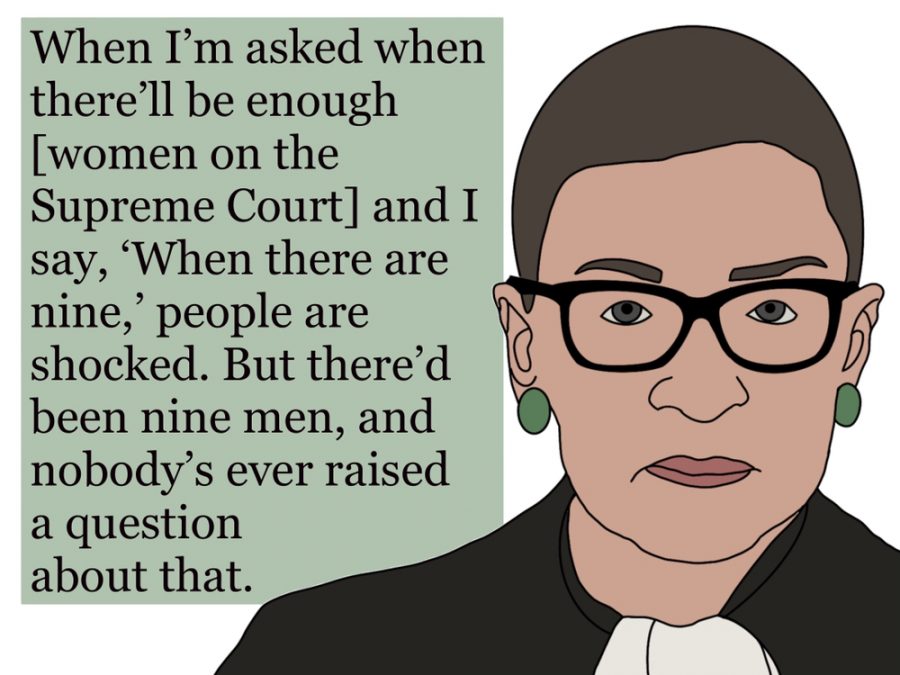Justice Ruth Bader Ginsburg impacts women of Grady
Justice Ginsburg had many famous quotes, this is one of them.
October 13, 2020
U.S. Supreme Court Justice Ruth Bader Ginsburg inspired many women to fight for their beliefs and defeat gender norms. The women of Grady continue to feel Ginsburg’s impact even after her death and recognize the pivotal changes she made while she was a justice.
“She was apart of the decision to legalize gay marriage, and she’s decided a lot of other big civil rights cases,” said senior Joanna Baker. “She definitely has always been a really strong figurehead for all of those movements, not just women’s rights.”
Ginsburg, 87, who died of pancreatic cancer on Sept. 18, was appointed to the Supreme Court in 1993 by President Bill Clinton, and her approval rating was above average. She won her seat after a 96-3 landslide vote in the Senate. Her actions within her seat were pivotal in moving certain human rights causes forward. Assistant principal Carrie MacBrien believes her ability to impact great change was due to her well-thought-out approach to the issues she would challenge.
“The way she fought for gender equality, which she had a reputation for and it was one of the signature issues she worked on, wasn’t in a radical way,” MacBrien said. “It was a very thoughtful, methodical process. When you read her dissent and hear her speak about different issues, everything was just quiet, thoughtful, precise and confident where she illustrated difference of opinion without disrespecting other viewpoints.”
As one of the first female justices on the Supreme Court, Ginsburg was a trailblazer for women in an occupation dominated by men. History teacher Sara Looman recalls her college classes being mostly made up of men and notes that Ginsburg’s position was important to women at the time.
“When I went to college, there weren’t very many women in the history department,” Looman said. “ In my upper-level classes, I went to a small school and I was often the only girl in the class.”
Ginsburg inspired many women to pursue the jobs they hold today. MacBrien remembers growing up with only male representation in the position she currently has.
“When I was coming up through school from the late 70s to the late 80s, I didn’t have a single female principal,” MacBrien said. “I didn’t have a single assistant principal, and the assistant principals at the time were almost always former coaches. Around the time that I was coming up, it was shortly after she [Ginsburg] had had her struggles and had to fight and prove herself in a completely different way in a male-dominated profession.”
Ginsburg not only impacted the people who lived during her rise to power, but she also had an impact on the youth at Grady. Baker said Ginsburg’s involvement in other human rights causes has encouraged her to speak up.
“She has for sure inspired me to fight for causes today,” Baker said. “ I think she is just someone who really pushed a lot of boundaries especially when she was younger, and it was not really a common place for a woman like her to be in the position of power that she is in. She had a lot of really, at the time, radical ideas that most people hadn’t even considered.”
Justice Ginsburg also brought Jewish representation to the court. Baker, who is Jewish herself, believes Ginsburg played an important role in terms of religious equality.
“I’m Jewish and my family is Jewish, so having that representation was really meaningful,” Baker said.
Ginsburg’s impact will be lasting. Looman believes her influence will be seen alongside other groundbreaking figures, but the ultimate goal is to achieve commonality in minorities holding powerful positions.
“The legacy for any of our reformers, whether it’s somebody like Justice Ginsburg who was interested in advancing the cause of women’s equality or Dr. King with civil rights, I’d like to think that ultimately what we achieve is boredom,” Looman said. “What I mean by boredom is we eventually will get to a point where there will be the 10th, the 12th, the 50th woman on the Supreme Court. At that point, we can think, ‘Wow, look what we’ve done. It’s so accepted and it’s not remarkable that anyone can pursue what they want.’ We now don’t look at it as another battle to be fought.”








